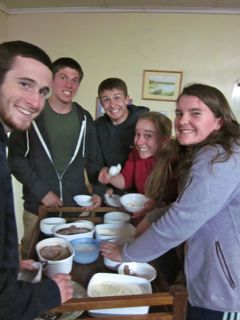*Sorry for the lateness of this post- the internet was slow here yesterday, it's hard to say why. Either it was national call your mother day in Zambia (so the lines were busy) or there was a misplaced cloud when I was trying to post.
We’ve spent
almost two weeks at the Macha Research Trust campus, and today we finally got
to see the lab! I love the lab! Sungano Mharaaurwa is the scientific director
for the labs, and he talked with us about both the history of the research and
what they are doing currently to study malaria (they are also studying HIV/AIDS
and TB, but Sungano didn’t have 4 days to spend explaining all of that research
to us, so we had to be content with hearing about the malaria lab). There are a
number of interesting questions that they are working to address in the lab
here. Questions of resistance to drugs, how the mosquitoes survive the dry
season and they are trying to track some of the mosquitoes. I am sure you have
all seen birds with tags on their legs, or know that they often will tag whales
or sharks to track their migration. Imagine trying to tag or track a mosquito!
There are so many of them and they are so tiny! They suspect that if they find
one of their dye marked mosquitos that it represents many hundreds to thousands
of mosquitoes! What a daunting task!
 |
| Sungano and Limonty gave us a tour of the lab. |
We have been
talking about malaria in class as well. The cases of malaria and the disease prevalence
in this area has been very significantly reduced over the last 15 years, due of
course to a number of factors- many of them being Dr. Thuma’s idea. Malaria is
one of those diseases that you don’t confront with just one weapon, but towards
which you throw every possible solution. This has worked in this area, but it
makes it very hard to piece out which of the tools of battle had the biggest
impact on reducing malaria in this area. It is interesting to look at how the
focus on malaria has changed over the years. Outside of the Macha area (for
example the rest of Africa, South East Asia etc), fighting or eliminating
malaria locally has had much less success. It wasn’t until a couple of years
ago (in 2004 and again more recently) that Bill Gates has said that he will
fund efforts to eradicate (they call it the ‘E’ word here) malaria worldwide.
This is a VERY ambitious goal, and one that many people don’t think we (as the
world) will ever achieve, but there is certainly a significant place for
eliminating the disease in certain places, and for lowering the overall
worldwide prevalence of the disease. For
this reason, even though malaria is nearly gone from this area, it is important
to continue to study the disease here at Macha.
 |
| You might not get excited by seeing a full row of pipettemen, but aren't they beautiful? |
In fact, one
of the students on the trip, Keane, is staying here in Macha after the rest of
us leave to go back to the US, and will be working in the lab with Sungano for
the rest of the summer. I would love to stay as well, but didn’t have the
foresight to make it a reality! Keane has already had some good lab experience
at Messiah College, and will be well prepared to jump in and work on either a
malaria or HIV/AIDS research project during his summer in Africa.
 |
| Keane will be working with Sungano for the rest of the summer. |
































